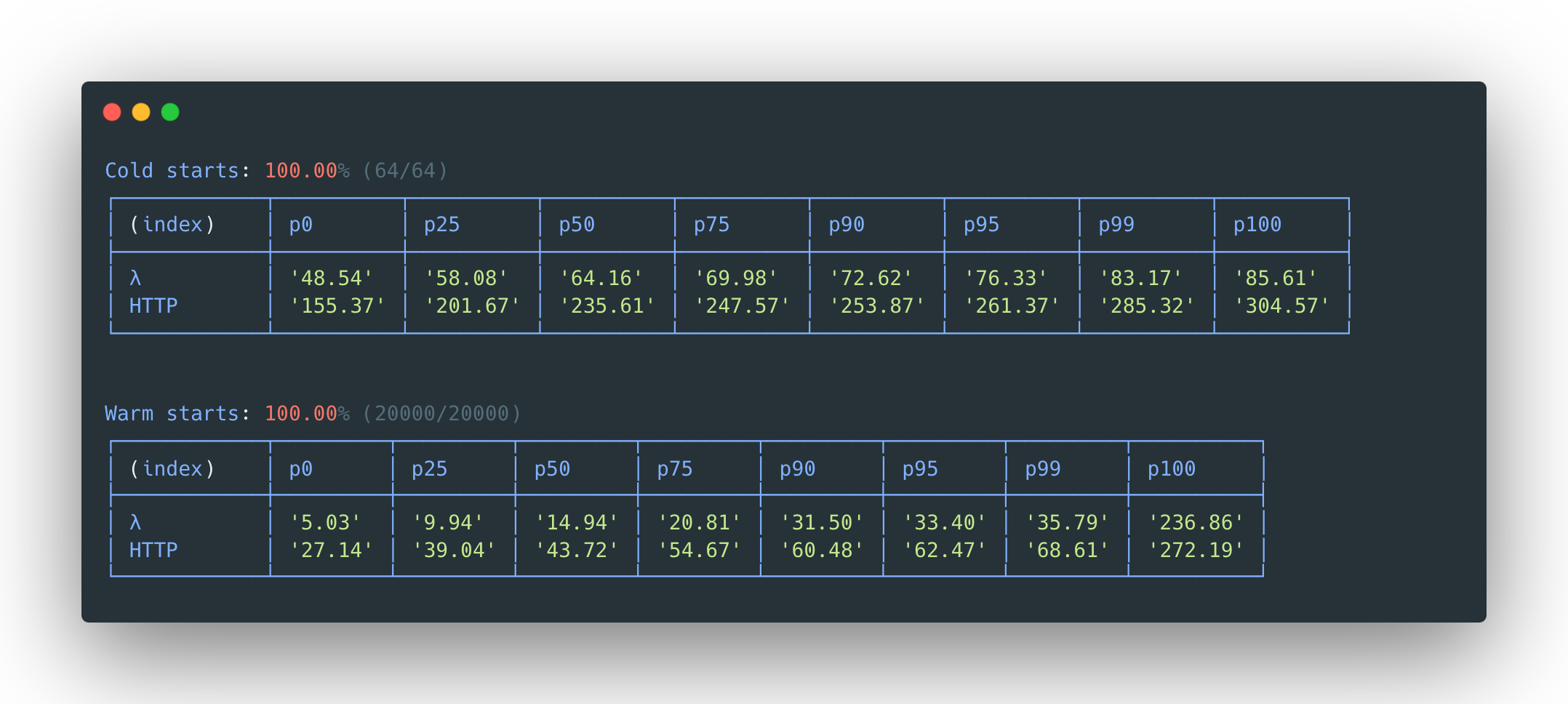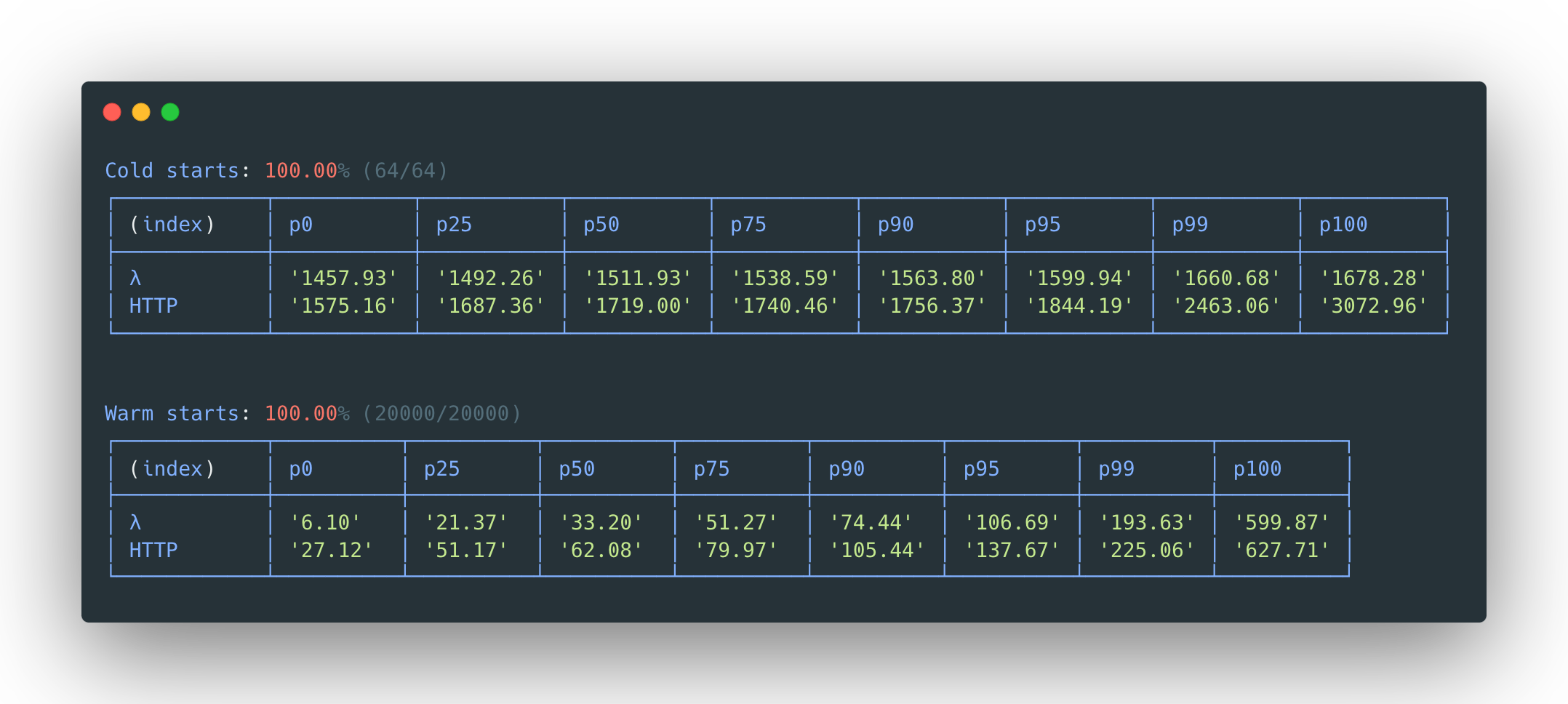LLRT (Low Latency Runtime) is a lightweight JavaScript runtime designed to address the growing demand for fast and efficient Serverless applications. LLRT offers up to over 10x faster startup and up to 2x overall lower cost compared to other JavaScript runtimes running on AWS Lambda
It's built in Rust, utilizing QuickJS as JavaScript engine, ensuring efficient memory usage and swift startup.
Warning
LLRT is an experimental package. It is subject to change and intended only for evaluation purposes.
LLRT - DynamoDB Put, ARM, 128MB:

Node.js 20 - DynamoDB Put, ARM, 128MB:

Download the last LLRT release from https://github.com/awslabs/llrt/releases
Choose Custom Runtime on Amazon Linux 2023 and package the LLRT bootstrap binary together with your JS code.
Choose Custom Runtime on Amazon Linux 2023, upload llrt-lambda-arm64.zip or llrt-lambda-x86.zip as a layer and add to your function
Thats it 🎉
Important
Even though LLRT supports ES2020 it's NOT a drop in replacement for Node.js. Consult Compatibility matrix and API for more details.
All dependencies should be bundled for a browser platform and mark included @aws-sdk packages as external.
The best way to ensure that your code is compatible with LLRT is to write tests and executing them via the built in test runner
Test runner uses a lightweight Jest-like API and uses the assert module from Node.js for test assertions. For examples how to implement tests for LLRT see the /tests folder of this repository.
To run tests, execute the llrt test command. LLRT scans the current directory and sub-directories for files that ends with *.test.js or *.test.mjs. You can also provide a specific test directory to scan by using the llrt test -d <directory> option.
The test runner also has support for filters. Using filters is as simple as adding additional command line arguments, i.e: llrt test crypto will only run tests that match the filename containing crypto.
Note
LLRT only support a fraction of the Node.js APIs. It is NOT a drop in replacement for Node.js, nor will it ever be. Below is a high level overview of partially supported APIs and modules. For more details consult the API documentation
| Node.js | LLRT |
|
|---|---|---|
| buffer | ✔︎ | ✔︎️ |
| streams | ✔︎ | ✔︎* |
| child_process | ✔︎ | ✔︎⏱ |
| net:sockets | ✔︎ | ✔︎⏱ |
| net:server | ✔︎ | ✔︎ |
| tls | ✔︎ | ✘⏱ |
| fetch | ✔︎ | ✔︎ |
| http | ✔︎ | ✘⏱** |
| https | ✔︎ | ✘⏱** |
| fs/promises | ✔︎ | ✔︎ |
| fs | ✔︎ | ✘⏱ |
| path | ✔︎ | ✔︎ |
| timers | ✔︎ | ✔︎ |
| uuid | ✔︎ | ✔︎ |
| crypto | ✔︎ | ✔︎ |
| process | ✔︎ | ✔︎ |
| encoding | ✔︎ | ✔︎ |
| console | ✔︎ | ✔︎ |
| events | ✔︎ | ✔︎ |
| ESM | ✔︎ | ✔︎ |
| CJS | ✔︎ | ✔︎ |
| async/await | ✔︎ | ✔︎ |
| Other modules | ✔︎ | ✘ |
Since LLRT is meant for performance critical application it's not recommended to deploy node_modules without bundling, minification and tree-shaking.
LLRT can work with any bundler of your choice. Below are some configurations for popular bundlers:
esbuild index.js --platform=node --target=es2020 --format=esm --bundle --minify --external:@aws-sdk --external:uuid
import resolve from 'rollup-plugin-node-resolve';
import commonjs from 'rollup-plugin-commonjs';
import { terser } from 'rollup-plugin-terser';
export default {
input: 'index.js',
output: {
file: 'dist/bundle.js',
format: 'esm',
sourcemap: true,
target: 'es2020',
},
plugins: [
resolve(),
commonjs(),
terser(),
],
external: ["@aws-sdk","uuid"],
};import TerserPlugin from 'terser-webpack-plugin';
import nodeExternals from 'webpack-node-externals';
export default {
entry: './index.js',
output: {
path: "dist",
filename: 'bundle.js',
libraryTarget: 'module',
},
target: 'web',
mode: 'production',
resolve: {
extensions: ['.js'],
},
externals: [nodeExternals(),"@aws-sdk","uuid"],
optimization: {
minimize: true,
minimizer: [
new TerserPlugin({
terserOptions: {
ecma: 2020,
},
}),
],
},
};LLRT includes many AWS SDK clients and utils as part of the runtime, built into the executable. These SDK Clients have been specifically fine-tuned to offer best performance while not compromising on compatibility. LLRT replaces some JavaScript dependencies used by the AWS SDK by native ones such as Hash calculations and XML parsing. V3 SDK packages not included in the list below have to be bundled with your source code while marking the following packages as external.
Bundled AWS SDK packages:
- @aws-sdk/client-dynamodb
- @aws-sdk/lib-dynamodb
- @aws-sdk/client-kms
- @aws-sdk/client-lambda
- @aws-sdk/client-s3
- @aws-sdk/client-secrets-manager
- @aws-sdk/client-ses
- @aws-sdk/client-sns
- @aws-sdk/client-sqs
- @aws-sdk/client-sts
- @aws-sdk/client-ssm
- @aws-sdk/client-cloudwatch-logs
- @aws-sdk/client-cloudwatch-events
- @aws-sdk/client-eventbridge
- @aws-sdk/client-sfn
- @aws-sdk/client-xray
- @aws-sdk/client-cognito-identity
- @aws-sdk/util-dynamodb
- @aws-sdk/credential-providers
- @smithy/signature-v4
Same principle as dependencies applies when using TypeScript. TypeScript must be bundled and transpiled into ES2020 JavaScript.
Note
LLRT will not support running TypeScript without transpilation. This is by design for performance reasons. Transpiling requires CPU and memory that adds latency and cost during execution. This can be avoided if done ahead of time during deployment.
What justifies the introduction of another JavaScript runtime in light of existing options such as Node.js, Bun & Deno?
Node.js, Bun, and Deno represent highly proficient JavaScript runtimes. However, they are designed with general-purpose applications in mind. These runtimes were not specifically tailored for the demands of a Serverless environment, characterized by short-lived runtime instances. They each depend on a (Just-In-Time compiler (JIT) for dynamic code compilation and optimization during execution. While JIT compilation offers substantial long-term performance advantages, it carries a computational and memory overhead.
In contrast, LLRT distinguishes itself by not incorporating a JIT compiler, a strategic decision that yields two significant advantages:
A) JIT compilation is a notably sophisticated technological component, introducing increased system complexity and contributing substantially to the runtime's overall size.
B) Without the JIT overhead, LLRT conserves both CPU and memory resources that can be more efficiently allocated to code execution tasks, thereby reducing application startup times.
There are many cases where LLRT shows notable performance drawbacks compared with JIT-powered runtimes, such as large data processing, Monte Carlo simulations or performing tasks with hundreds of thousands or millions of iterations. LLRT is most effective when applied to smaller Serverless functions dedicated to tasks such as data transformation, real time processing, AWS service integrations, authorization, validation etc. It is designed to complement existing components rather than serve as a comprehensive replacement for everything. Notably, given its supported APIs are based on Node.js specification, transitioning back to alternative solutions requires minimal code adjustments.
Clone code and cd to directory
git clone git@github.com:awslabs/llrt.git --recursive
cd llrt
Install rust
curl --proto '=https' --tlsv1.2 -sSf https://sh.rustup.rs | bash -s -- -y
source "$HOME/.cargo/env"
Install dependencies
# MacOS
brew install zig make zstd node corepack
# Ubuntu
sudo apt -y install make zstd
sudo snap install zig --classic --beta
Install Node.js packages
corepack enable
yarn
Install generate libs and setup rust targets & toolchains
make stdlib && make libs
Build release for Lambda
make release-arm64
# or for x86-64, use
make release-x64
Optionally build for your local machine (Mac or Linux)
make release
You should now have a llrt-lambda-arm64.zip or llrt-lambda-x86.zip. You can manually upload this as a Lambda layer or use it via your Infrastructure-as-code pipeline
Please note that in order to run the example you will need:
- Valid AWS credentials via a
~/.aws/credentialsor via environment variables.
export AWS_ACCESS_KEY_ID=XXX
export AWS_SECRET_ACCESS_KEY=YYY
export AWS_REGION=us-east-1- A DynamoDB table (with
idas the partition key) onus-east-1 - The
dynamodb:PutItemIAM permission on this table. You can use this policy (don't forget to modify <YOUR_ACCOUNT_ID>):
{
"Version": "2012-10-17",
"Statement": [
{
"Sid": "putItem",
"Effect": "Allow",
"Action": "dynamodb:PutItem",
"Resource": "arn:aws:dynamodb:us-east-1:<YOUR_ACCOUNT_ID>:table/quickjs-table"
}
]
}Start the lambda-server.js in a separate terminal
node lambda-server.js
Then run llrt:
make run
See CONTRIBUTING for more information.
This library is licensed under the MIT-0 License. See the LICENSE file.